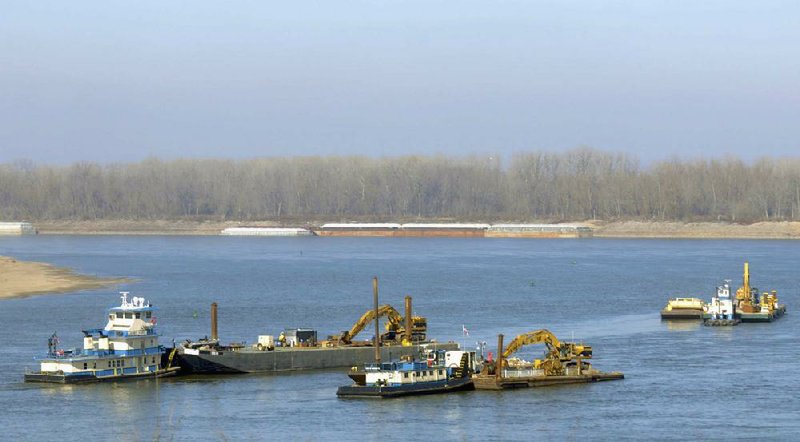THEBES, Ill. — Two Illinois congressmen on Monday inspected urgent efforts to clear Mississippi River bedrock that has crimped shipping on a crucial stretch of the waterway and said they’re closely monitoring the situation.
Sen. Dick Durbin and newly elected Rep. Bill Enyart, both Democrats, were briefed by the U.S. Army Corps of Engineers and Coast Guard about the work before touring by boat the site near Thebes in southern Illinois that has grown especially worrisome to the barge industry.
Durbin said “Mother Nature has dealt us a difficult hand” with the lingering, months-long drought that has dropped river levels. Enyart said he’s “deeply concerned” about the economic implications of the lower depths of the Mississippi.
“As goes the Mississippi, so goes much of the industry in Illinois,” Durbin said later in a statement, noting that President Barack Obama’s administration is “monitoring this situation carefully.”
The rock-clearing effort about 150 miles south of St. Louis is considered vital in ensuring that stretch of river remains open to barge traffic. Industry trade groups have expressed concern that the river could drop to such a point - 3 feet on the river gauge at Thebes - that barge weight restrictions could be further tightened, effectively halting shipping.
Drafts, or the portion of each barge that is submerged, already are limited to 9 feet in the middle Mississippi. If the river gauge gets to 3 feet at Thebes, the Coast Guard may be forced to limit drafts even further.
Officials with the trade group say that if drafts are restricted to 8 feet or lower, many operators will stop shipping.
National Weather Service hydrologists forecast that the river at Thebes could drop to the 3-feet mark by Jan. 17 and continue falling to the 1.5-foot mark by early February.
The Mississippi will be deep enough through January to support commercial barge traffic, said Corps. Major General John Peabody, citing the dredging work and favorable weather forecasts.
Peabody said Monday that dredging should maintain a 10-foot channel through the end of the month, which is deep enough for commercial vessels on the river south of St. Louis.
During a typical January, $2.8 billion worth of goods flows between St. Louis and Cairo, Ill., including 5 to 7 million tons of grain for cattle feed all over the world, coal for power plants across the globe and cement for construction, according to Illinois officials.
The Corps’ work removing rock obstacles near Thebes will continue until the end of the month, Peabody said. The channel should be 2 feet deeper by the end of this week, he said.
Recent rains and water releases from the corps’ Carlyle Lake in Illinois improved water levels for the Middle Mississippi River, the corps said last week.
“There’s nothing pretty about this,” Coast Guard Lt. Colin Fogarty said Friday. “We are facing a historic drought. River levels are at record lows we haven’t seen since 1941. Over six weeks the Army Corps has dredged record amounts of the river.”
But, Fogarty said, reports that the Mississippi will close are as reliable as doomsday projections “based on the Mayan calendar.”
Tamara Nelson, senior director of commodities for the Illinois Farm Bureau, has faith in the corps, but is worried by the long Midwest dry spell.
“Not being able to move anything on that river will be critical, a big hit,” she said. “It affects tax revenues for the federal government, it affects jobs.
“I don’t think you can really exaggerate the level it has fallen to,” Nelson said. “I’ve been here 15 years in Illinois, worked in agriculture almost 30 ... and to see what is typically a bank-to-bank Mississippi full of water ... now become almost hillsides of sand is like watching a lake empty.” Information for this article was contributed by The Associated Press, Brian Wingfield of Bloomberg News and Darryl Fears of The Washington Post.
Business, Pages 21 on 01/08/2013

